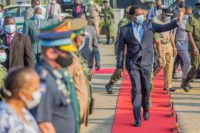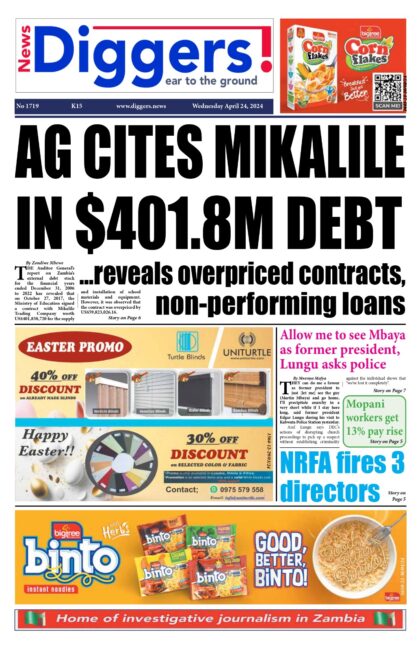Finance Minister Dr Bwalya Ng’andu says government is currently making payments to Maamba Collieries and that the balance will be liquidated in the next one week.
And Dr Ng’andu has disclosed that government has paid US $27 million to South Africa’s power utility Eskom for importation of power, but for just one month.
Speaking to journalists after an IMF Mission Team paid a courtesy call on President Edgar Lungu at State House, Thursday, Dr Ng’andu said as soon as Maamba Collieries would resume power supply back to the national grid, it would help in mitigating Zambia’s power deficit, which had leaped to 872 megawatts.
“The other challenge that is left is Maamba (Collieries), and I think you are aware from before that one of the machines is down and that generates about 150 megawatts of power and we are down by 150 megawatts, and I hope that we can get that one done (sorted out). We are making some payments to Maamba, today (Thursday), and hopefully, the balance will be paid in the next one week,” Dr Ng’andu announced.
“I need to stress the point that the situation is quite tight, but I hope that with the rains coming, it might change slightly. If things remain the way they are, we may find ourselves in a very dangerous position as far as generation of power from Kariba is concerned. So, what we are hoping to do is to run the turbines at the rate that it doesn’t deplete the waters quickly, but at the same time, giving us a reasonable amount of power to homes as well as the industries. The importation of power, clearly, will be able to meet some of the deficit that we have, and as soon as we get Maamba on board, we will again have capacity.”
And Dr Ng’andu disclosed that government had paid US $27 million to South Africa’s power utility Eskom for importation of power for one month.
“In terms of the imports from South Africa; we have made the obligation. We have paid. I hope the bank has transferred the money, but I can tell you that for this month, for one month for us to import 300 megawatts of power from Eskom, we need US $27 million, which we have the resources for. As to exactly when the power is coming in, I have to speak to Zesco to see when that is going to happen, but that is a question; it is matter of the transaction being implemented as opposed to looking for resources to pay; we have the resources,” he said.
Meanwhile, Dr Ng’andu said the IMF Mission Team was in the country to assess progress on Zambia’s macroeconomic position.
“Basically, the position, now, is that we have a team of three people from the IMF; the team constitutes what we call a ‘scope in mission’ and their job for the next five to six days is to look at the macroeconomic numbers. And based on these numbers, we shall sit with them with a view of developing a macroeconomic framework that should be able to take us where we should be going. So, basically, it is a mission to assess where we are and based on that assessment to design a programe of intervention, which both of us and them agree to as one we should implement,” Dr Ng’andu explained.
“What I need to indicate is that as part of the framework we are working on, we will be presenting to Cabinet the proposals of measures that we need to take in order for us to get to the point of debt sustainability, which is the biggest issue that IMF is concerned about. So, in terms of engagement, we will continue beyond that process.”
He said the IMF was also worried about the rate at which the country projected the economy to grow.
“Well, obviously, the other issues are the rate of growth of the economy. As you can see, the rate at which we’re projected the economy to grow this year is two per cent, which falls short of the initial projections. The initial projections were about four per cent. So, we think we are growing at a rate that is much lower than we should be because I think the growth of the population is now higher than the two per cent so they are concerned about that,” said Dr Ng’andu.












